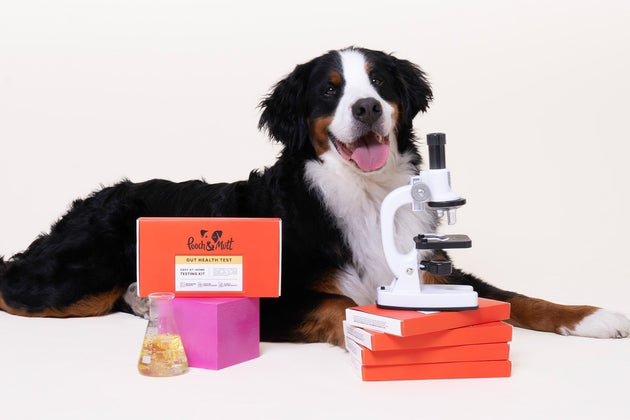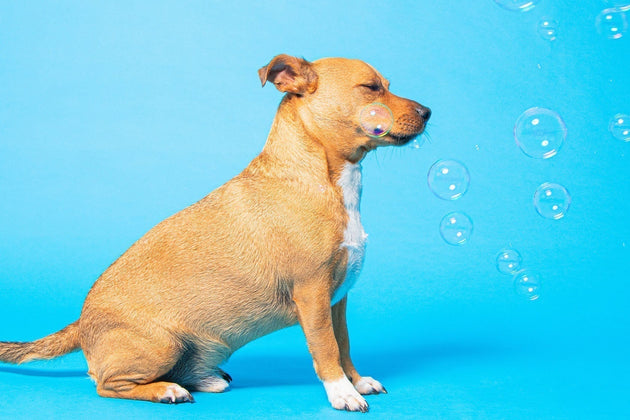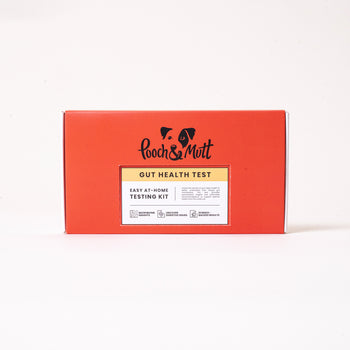Your dog’s gut microbiome plays a key role in their overall health and wellbeing.
A powerhouse within their body, it touches and directly impacts so many areas of your dog, meaning it needs to be running like a well-oiled machine.
As a dog owner, getting acquainted with your dog’s microbiome is crucial in taking a step towards achieving optimum health for your dog - and even tackling a myriad of common yet detrimental symptoms.
Let’s take a deep dive into some of the key things you, as a dog owner, should know about your dog’s gut microbiome. Our aim is to arm you with all the information you need to get your dog feeling happy and healthy, from the inside out!
Firstly, what is the gut microbiome?
The gut microbiome is a mini ecosystem of bacteria that lives within your dog’s gut. The bacteria, or microbiota, vary in type, species, and function and produce beneficial compounds like acids and sugars in your dog’s body.
These act as crucial components in several key processes, such as digestion, and, in summary, keep your dog’s body functioning as it should - allowing them to live life with their best paw forward.
To explore more about the gut microbiome, its function, its role, where it came from and why it’s so important, be sure to check out our article - Your Dog’s Gut Health: What is a microbiome?
What does a healthy gut microbiome look like for your dog?
A healthy dog that has had the best possible start in life should, in turn, have a healthy gut microbiome. But if we take a peek inside your dog’s gut, what does a healthy microbiome look like exactly?
A healthy gut microbiome is largely determined by the diversity of the microbiota, or in other words, the bacteria that reside and function in the gut.
According to resident Head of Microbiology Dr Bushra Schuitemaker:
“A healthy gut microbiome for your dog is rich and balanced, meaning it’s full of bacteria of varying types in EQUAL proportion. So no species of bacteria is lacking or taking over the entire ecosystem.
A rich and balanced microbiome ecosystem produces the right amounts of acids, alcohols, and sugars that help feed other bacteria and play a crucial role in enabling other bodily processes to function at full capacity. It is also a crucial component in overall good gut health, benefiting its strength and function.”
“The right levels of bacteria, or Phyla Balance, are impacted by a long list of factors, including your dog’s diet.
Just like your dog, the living bacteria need not only the right environment but also the right nutrients to thrive, making diet and a healthy lifestyle a key component to a 5-star microbiome.”
What kind of bacteria live in your dog’s gut microbiome?
There are lots of bacteria that live within your dog’s gut microbiome, varying in type, species and function.
When assessing the health of the microbiome and checking the balance of the microbiota, there is a list of key bacterial types that are looked at.
Some of the functional genus groups within your dog’s gut microbiome, and the vital role they play, include:
Peptacetobacter
- The most common bacteria found in a healthy dog’s gut microbiome.
- It helps turn nutrients gained from diet and supplements into functional goodness for the rest of the body.
- Peptacetobacter must stay balanced for optimum health and wellbeing for your dog.
- Low levels of Peptacetobacter are often seen in antibiotic-induced dysbiosis and a range of intestinal diseases.
Blautia
- The second most common species found in a healthy dog’s gut microbiome.
- It makes up 15-30% of a healthy gut microbiome.
- It helps alleviate obesity and helps your dog with weight management.
Fusobacterium
- This bacterium takes up 15% of a healthy dog’s gut microbiome.
- It plays a very important role in helping your dog digest protein and creating amino acids that are vital for their overall health and wellbeing.
- There are 13 species of Fuscobacterium, and they are found to naturally increase in population in alignment with a dog’s age.
- Fuscobacterium helps your dog digest protein, contributes to coat and skin health, heart health, and vitamin and mineral absorption.

Faecalibacterium
- There are 217 species of this genus in a healthy microbiome.
- Faecalibacterium contributes to the regulation of your dog’s immune system, helping to promote overall gut health.
- It helps build up and strengthen the gut wall barrier, helping to fight against harmful pathogens.
- It’s anti-inflammatory and helps to produce crucial energy for the gut that keeps things ticking on.
- Faecalibacterium is a great bacteria for senior dogs, due to its contribution to heart health, joint health, mobility, weight management and overall life longevity.
Clostridium
- There are 164 species of Clostridium, some are disease-causing, but they’re not all bad, with many others being crucial for gut function and the production of beneficial vitamins.
- In a healthy dog’s microbiome, Clostridium make up only 0-3% of their overall microbiota.
- Clostridium are known to reduce gut inflammation, aid vitamin and mineral absorption, cardiovascular function, coat and skin health and are even known to target cancer cells. Too much Clostridium however, are known to contribute to foul-smelling farts.
Bacteroides
- There are around 30 species of Bacteroides, and they take up between 5-9% of their microbiota.
- They contribute to many functions, including carbohydrate and immune system regulation, inflammation control, cardiovascular function and even brain function and behaviour.
Megamonas
- This is vital for the immune system as it helps your dog protect itself against harmful bacteria.
- It has 6 species, and helps fibre digestion, coat and skin health, heart health, joints and mobility and helps to fuel the gut to keep everything running smoothly.
Sutterella.
- Crucial for the everyday function of your dog’s immune system.
- 4 species exist in a healthy microbiome, making up around 2-3% of it.
- Being champions of immunological function, Sutterella helps protect your dog from harmful diseases, microbes and general inflammation, especially those caused by dysbiosis.
- It’s vital for protein digestion, coat and skin health, and brain health and function.
Alloprevotella
- Helps digest complex carbohydrates and proteins and has previously been linked to improving obesity in dogs.
- 2 existing species make up 3-5% of the overall microbiome and have been linked directly to gut health due to their ability to help reduce diarrhoea.
- Low levels of Alloprerotella are believed to lead to impaired energy metabolism in dogs, making the balance of this bacterium crucial to their overall well-being, quality of life and higher energy levels. (Much needed for those big walks and hours of playing!).

Lactobacillus
- This genus group only takes up 1-7% of a healthy microbiome. Those with lower amounts of Lactobacillus can pose a cause for concern.
- Lactobacilli are responsible for contributing to many key processes, including the digestion of fibre and fat, as well as gut resilience and overall immunological function.
- It aids vitamin and mineral absorption and brain function, directly impacting behaviour.
- Studies have found that dogs fed on raw food typically have a lower percentage of Lactobacillus due to the higher content of protein over fibre in their diet. It’s also been said that dogs who eat grass are also found to have lower levels of Lactobacillus.
Escherichia
- There are 5 species of Escherichia, one of them being E. coli.
- Despite E. coli’s bad reputation, it can be very beneficial for your dog, especially when it comes to vitamin production, like Vitamin K, carbohydrate fermentation and the production of crucial fatty acids.
- In a healthy dog, Escherichia takes up about 0.5-3% of their overall microbiome, so it is relatively low.
- Aids your dog’s digestion of carbohydrates, helps with gut inflammation, gut resilience, vitamin and mineral absorption, breath odour and heart health and function.
Pooch & Mutt’s Head of Microbiology, Dr Bushra Schuitemaker, states:
“Some bacteria, like E. coli are ‘opportunistic pathogens’, meaning in the right environment, they do have the potential to become harmful. But with the right levels and a rich and balanced microbiome, they can be more beneficial than harmful!”
Phascolarctobacterium
- Despite taking up a small percentage of a healthy microbiome, this genus is crucial for your dog’s overall health and wellbeing as it contributes to their energy levels and metabolic health.
- Aids water, vitamin and mineral absorption, carbohydrate and protein digestion, the function of the immune system, gut resilience, joint health and mobility.
- Higher levels have been found in puppies, showing how the microbiome differs with age.
Collinsella
- Assessments have shown that dogs with diarrhoea often have elevated levels of Collinsella in their microbiome.
- At the right level, Collinsella contributes greatly to building up the intestinal lining integrity, helping to reduce inflammation, aiding brain health and function, including behaviour, and carbohydrate digestion.
Prevotella
- Crucial for building up the defence against the growth of harmful bacteria within your dog’s gut.
- Helps to keep inflammation at bay and contributes to the fermentation of fibre and carbohydrates, along with immunological function and behaviour.
How do we know a dog’s microbiome is healthy?
When reviewing the health and diversity of your dog’s microbiome, host and other environmental factors, as well as medical history (including vet diagnoses and treatment) should also be taken into consideration.
This includes any diseases they currently or previously have had, including obesity, gastrointestinal disease, dental diseases, osteoarthritis and skin allergies. These just happen to be some of the most common diseases in dogs, and can all be linked directly to their microbiome.
Looking at the diversity of their microbiome in conjunction with their medical history, and the other host and environmental factors that impact it, can tell us a lot about their overall health.
It can also tell us a lot about your dog’s gut health, including its maturity (meaning whether their microbiome reflects how it should at their age), permeability, immunity, inflammation, functionality, and digestibility.
This gives us an outlook on not only the health of their gut and its microbiome, but also the rest of their body.
To investigate the diversity of your dog’s gut microbiome and overall gut health, you can take a Gut Health Test, which is done via a stool sample. Explore more about gut health tests for dogs and our entire gut health supplement range here.
What are the impacting factors on your dog’s gut microbiome?
When we talk about impacting factors on your dog’s microbiome, these include circumstances which knock its balance and diversity. Some factors are out of your control, but others can be optimised as part of their gut health journey.
As we learnt in our previous explorations of what the gut microbiome is, the microbiome is built up from the minute your dog’s in the womb, and is developed via a healthy birthing process and good start to life. Even before then, your dog’s breed and genetics also impact their gut health.
From then on, there are a wide range of external and environmental factors that, if anything, are more impactful than those that stem from their mum and their genetics. These can vary in the level of impact, and can be unique to each individual dog.
Examples of environmental factors that impact your dog’s gut microbiome include:
-
Diet. This includes the brand of dog food they eat, the type of dog food (i.e. fresh, raw, kibble), how much they eat, their weight, how often they eat, and how much water they drink.
-
Their household. This can include where you live, by area or part of the country, who they live with, like children or other dogs, and their daily social interactions. The level of impact can also differ according to the season, with their environment during the winter being more impactful on their microbiome diversity than the summer months. This is mainly due to the changes in routine and the weather.
-
Their lifestyle. This can include their activity levels, whether they’re more active or relaxed, whether they spend time at the beach or park more often, and even if they get their coat cut regularly at the groomers.
How do antibiotics affect your dog’s gut microbiome
Being on antibiotics, whether currently or previously, can impact your dog’s gut microbiome in a big way.
Whilst antibiotics are usually the go-to when treating bacterial infections, they also wreak havoc amongst their microbiota.
Antibiotics work by clearing your dog of not just the harmful bacteria that are causing them harm, but ALL bacteria - completely knocking the balance of their microbiome diversity, which in turn leads to other complications.
To learn more about how antibiotics impact your dog’s microbiome, explore our article: ‘How do antibiotics affect your dog's gut microbiome’.
What is an unhealthy gut microbiome for your dog?
Whilst a healthy dog’s gut microbiome is rich and balanced, with bacteria of varying types and equal proportion, an unhealthy microbiome is the opposite.
It’s true to say that what makes a healthy microbiome is individual to each dog, but there are a few indicators to show that it’s not thriving as it should.
When spotting an unhealthy microbiome, we often look out for something referred to as Dysbiosis.
This is the name given to a general dysregulation or unbalance within their gut ecosystem. This occurs when one bacterium outgrows all the other bacteria.
With this overgrowth of bacteria, normal function gets thrown out the window, and the regular balance and production of crucial compounds like acids, sugars, and alcohols are impacted, causing a domino effect in the gut and around the rest of the body.
When dysbiosis is left untreated, it causes inflammation of the gut, its tissue, and its wall or lining. This causes its strong barrier to break down, allowing harmful nasties to escape from the gut and cause havoc amongst the rest of their body - spreading inflammation.
What effect does dysbiosis or inflammation have on your dog’s body?
When assessing your dog’s gut health, of course, we’re looking for a rich and balanced microbiome for everything to be working as it should. When dysbiosis occurs, which is easily done from a range of impacting factors, this can show through a number of symptoms.
Symptoms of dysbiosis can manifest themselves as common ailments in dogs. These can include, but aren’t limited to:
- Runny poos and diarrhoea
- General bad gut health
- Loss of appetite
- Skin irritation and allergy symptoms
- Hair loss
- Bad breath
- Smelly farts
- Weight loss or weight gain
- Joint pain
- Changes in behaviour or nervousness, anxiety and reactivity
- Lethargy/less energy than usual
Whilst many of these can be directly linked to dysbiosis, they can also be symptoms of other, underlying health conditions. That said, investigating your dog’s gut health can help rule out dysbiosis and narrow down your investigation into your dog’s health (saving a lot of further tests and vet visits).
On the other hand, your dog doesn’t have to be showing detrimental symptoms to have an unhealthy and unbalanced microbiome, which can make it tricky to uncover.
With so many impacting factors, we can never assume that our dogs’ insides are working as they should, especially as their microbiome diversity also naturally declines with age. This is why exploration, maintenance and most importantly prevention are key.
How do you help your dog’s gut microbiome?
Of course, as dog owners, we don’t have X-ray vision! But there are many ways to ensure you're treating your dog or preventing potential dysbiosis and inflammation as they get older.
The main way you can help your dog is through their diet and lifestyle. The right food and added prebiotics, probiotics, and supplements can help balance your dog’s microbiome and get them back on track.
There are certain superfoods that you can incorporate into your dog’s diet that are renowned for their benefits, including certain herbs, fruits, and vegetables.
But how do you know what the best diet is for your dog and their individual needs? This again is where a Gut Health Test comes in.
A Gut Health Test for your dog not only gives you an inside look at their microbiome diversity and how it's impacting them, but also a tailored outlook on how you can approach diet and lifestyle changes in order to help them.
If any of the mentioned symptoms ring any bells, or you’re wanting to get on top of your dog’s health, then a dog Gut Health Test is the next step forward. Tailor their diet and find out what’s best for them to live a long, happy and healthy life. Explore Gut Health at Pooch and Mutt to find out more.






















Comments (0)
Leave a comment